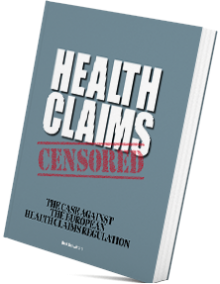By Bert Schwitters
4 July 2012
When voicing objections against the European Health Claims Regulation and the Commission’s “Positive List” Regulation, most if not all objectors decorate their statements with respectful wording that usually goes like this: “Although we agree with the principles underlying the Claims Regulation, we believe that some things have gone wrong in its interpretation, execution and administration.”
This politically correct behaviour of showing respect for the principles underlying the Health Claims Regulation is peculiarly irrational in the case of food business operators. When they embrace the main principle underlying the Regulation – the Precautionary Principle – and the prior constraint it places on communicating health claims concerning their product, they embrace the very principle that deprives them of their fundamental human right to communicate and that also deprives their commercial communications of the constitutional protection granted under what goes under the name of “freedom of speech” in the civilized world.
Business operators who pay homage to a prior constraint that deprives them of their natural human right to speak, voluntarily incriminate themselves as swindlers and frauds not worthy of being protected under the Universal Declaration of Human Rights. By accepting and acknowledging that the Precautionary Principle shall now also apply to what they wish to say about the nutritional and health benefits of their products, these businesspeople say: “Yes, of course, we acknowledge the presumption that all of us are crooks and therefore we wave our civil right of freedom of speech. We’re not civil and we’re not human. Please constrain us, so that we shall never speak again. Consumers must not be exposed to our words. We herewith wave the presumption of innocence and we accept the reversal of the burden of proof. Consider us guilty as long as we cannot prove we’re not. And then, when we speak, we pledge that we’ll only use Union-authorized public speech, so that consumers will understand that we, the suppliers of food, should not be trusted when we, businesspeople, speak of health.”
According to Wikipedia, the Stockholm syndrome is a psychological phenomenon in which hostages express empathy and have positive feelings towards their captors, sometimes to the point of defending them. These feelings are generally considered irrational in light of the danger or risk endured by the victims, who essentially mistake a lack of abuse from their captors for an act of kindness. The Stockholm syndrome can be seen as a form of traumatic bonding, which describes strong emotional ties that develop between two persons where one person intermittently harasses, beats, threatens, abuses, or intimidates the other.
In Europe, especially when they make public statements and even more so when speaking in “organized” contexts, food business operators who state that they honestly respect the principles underlying the Health Claims Regulation are showing serious signs of traumatic bonding vis à vis their captors. These operators irrationally mistake the European Commission’s publication of the Positive List – from which all of them may freely pick State-censored health claims they may use in selling their products – for an act of kindness that mitigates the abuse of power.
Lest we forget, the problem with the Health Claims Regulation is the very principle that underlies that infamous piece of legislation.




